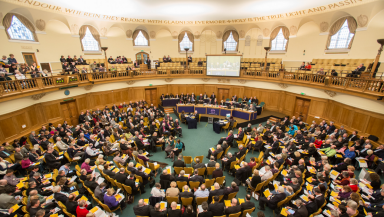
A General Synod member's brave bid at November's meeting to get legal clarity on services of blessing for same-sex couples has revealed the reluctance of elected clergy and laity to hold the Church of England's bishops to account.
This unfortunately does not bode well for due process in the implementation of the services, which the bishops are calling Prayers of Love and Faith (PLF).
On November 14, Clive Scowen, a lay member for London Diocese, moved an amendment to the main motion on the continuing implementation of the services. His amendment called on the "the House (of Bishops) to take no further steps towards implementing that motion until this Synod has considered the full legal advice received by the House prior to agreeing the proposals in GS 2328".
GS 2328 was the document circulated to Synod members before they met in Westminster setting out the bishops' plans for implementing the PLF services and a summary of the bishops' view of their legal basis under the C of E's Canons (rules), which are enshrined in English law.
Scowen is a trained barrister and former editor of the Law Reports published by the Incorporated Council of Law Reporting for England and Wales. He was scathing in his criticism of the bishops for not sharing the legal advice they had received with the Synod's Houses of Clergy and Laity.
He said: "Synod is profoundly divided both as to the rightness of the Prayers and as to the nature of our disagreement. At times like this, the laws of the Church are exceptionally important. They are the structure which enables a divided Church to function.
"So, surely the one thing we can all agree on is that we need clarity about whether what is proposed is lawful."
He continued: "And divided though we are, we are one Synod with three Houses. The House of Bishops has no legal existence apart from the Synod. Each House is equal. Each has to agree in order for Synod to make decisions."
He said the House of Bishops is "not the government or the executive or even a governance body over against the other Houses of Synod. Yet the bishops are not willing to share with the rest of us the advice that they have received.
"And it is not good enough to say that the advice is reflected in the papers. What we have there is the bishops' view of the advice received and what they've made of it. That is not the same thing."
He said the legal advice could be sent to Synod members that same day so that they could read it in the evening before the debate resumed the next day.
The Bishop of London, Sarah Mullally, the lead PLF bishop before she stepped down from that role post-Synod, resisted Scowen's amendment. She said: "GS 2328 is a document which is the foundation of the House of Bishops' theological and legal basis for how we are going forward."
She claimed the legal position set out in the paper "is clear and it is transparent".
To audible noises of protest from some members of Synod at Church House, Westminster, she suggested to Scowen that "tonight" he "go back, re-read GS 2328 and you will see the foundation of the legal advice that we have been given".
She said it was "impossible" to show Synod members the details of the legal advice because it came in "many forms". These forms included the results of "conversations" among the bishops which were not recorded.
She denied Scowen's contention that the Houses of Clergy and Laity have equal decision-making status with the House of Bishops. "Governance is entrusted to the House of Bishops," she said.
Scowen's amendment fell in all three Houses of Synod, with 22 bishops against, 10 for, and two abstentions; 99 clergy against, 88 for and no abstentions; and 98 laity against, 93 for and six abstentions.
Though the amendment would still have fallen because of the bishops' opposition, elected Synod members among the clergy and laity still had an opportunity to send a clear message to the bishops that they wanted equal access to the expert advice from church lawyers which the bishops had received. But they turned it down, albeit by a very narrow majority in the House of Laity.
The six abstentions among the laity may be revealing. Did the abstainers feel out of their depth in a legal argument?
Whatever members' motivation for voting against Scowen's amendment, its defeat is clear evidence that revisionist bishops eager to push ahead with same-sex blessings as quickly as they can get away with are winning the power struggle in the C of E.
Julian Mann is a former Church of England vicar, now an evangelical journalist based in the UK.













